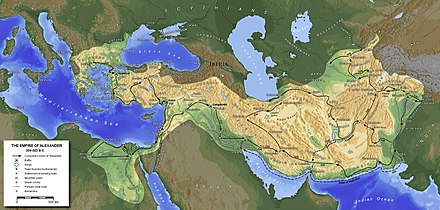Erik Mesoy
Core Tester / Intern
Okay, who thinks that the conquest and partial unification of this huge area:

is unlikely to have been done by one guy, in 300 BC times, in less than ten years?
So the main sources are from 300 to 500 years after Alexander's death. Can we even be sure that he existed? Seems to me like the Greeks warred for a far longer period of time, gradually recruiting the peoples they conquered into their army (which explains how they could advance so far), and then afterwards setting up a Hero of the People so that they could put a name and a leader to their great conquests. The Greeks were the winners, so they could write history.
Of course, the alleged "fact" that Alexander united the greek city-states a second and a third time after his father did so a first time puts the whole venture on a very shaky basis. How does a country undergoing so many civil skirmishes (not really wars) conquer the huge swath of land seen above in such a short time? If Alexander couldn't keep order at home, surely it would have been impossible for him to keep order in an empire including Israel, Greece, India and Babylon. Makes no sense at all.
ad. di., signing off.

is unlikely to have been done by one guy, in 300 BC times, in less than ten years?
Wikipedia said:Ancient sources are generally written with an agenda of either glorifying or denigrating the man.
The five main accounts are by Arrian, Curtius, Plutarch, Diodorus, and Justin.
* Anabasis Alexandri (The Campaigns of Alexander in Greek) by the Greek historian Arrian of Nicomedia, writing in the 2nd century AD, and based largely on Ptolemy and, to a lesser extent, Aristobulus and Nearchus. It is considered generally the most trustworthy source.
* Historiae Alexandri Magni, a biography of Alexander in ten books, of which the last eight survive, by the Roman historian Quintus Curtius Rufus, written in the 1st century AD, and based largely on Cleitarchus through the mediation of Timagenes, with some material probably from Ptolemy;
* Life of Alexander (see Parallel Lives) and two orations On the Fortune or the Virtue of Alexander the Great (see Moralia), by the Greek historian and biographer Plutarch of Chaeronea in the second century, based largely on Aristobulus and especially Cleitarchus.
* Bibliotheca historia (Library of world history), written in Greek by the Sicilian historian Diodorus Siculus [Insertion: 90 BC - 30 BC], from which Book 17 relates the conquests of Alexander, based almost entirely on Timagenes's work. The books immediately before and after, on Philip and Alexander's "Successors," throw light on Alexander's reign.
* The Epitome of the Philippic History of Pompeius Trogus by Justin [Insertion: 3rd century Roman historian], which contains factual errors and is highly compressed. It is difficult in this case to understand the source, since we only have an epitome, but it is thought that also Pompeius Trogus may have limited himself to use Timagenes for his Latin history.
So the main sources are from 300 to 500 years after Alexander's death. Can we even be sure that he existed? Seems to me like the Greeks warred for a far longer period of time, gradually recruiting the peoples they conquered into their army (which explains how they could advance so far), and then afterwards setting up a Hero of the People so that they could put a name and a leader to their great conquests. The Greeks were the winners, so they could write history.
Of course, the alleged "fact" that Alexander united the greek city-states a second and a third time after his father did so a first time puts the whole venture on a very shaky basis. How does a country undergoing so many civil skirmishes (not really wars) conquer the huge swath of land seen above in such a short time? If Alexander couldn't keep order at home, surely it would have been impossible for him to keep order in an empire including Israel, Greece, India and Babylon. Makes no sense at all.
ad. di., signing off.
